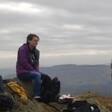Arts and Culture 15 February 2015
The London-based Royal Court Theatre, one of the British capital’s best-known theaters and notorious as a venue for innovative new work, has launched Fireworks (Al’ab Nariya in Arabic), a specially-commissioned play by Palestinian writer Dalia Taha and translated by Clem Naylor.
According to the theater’s publicity for Fireworks, the play depicts “eleven-year-old Lubna and twelve-year-old Khalil … playing on the empty stairwell in their apartment block. As the siege intensifies outside, fear for their safety becomes as crippling as the conflict itself.”
Taha explains that the play’s title refers to the way in which parents in Gaza tell their children that Israeli air attacks are actually fireworks — just one example, she says, of the narratives which Palestinians are forced to construct to try to shield children from the horrors of the outside world.
The Royal Court production confirms Dalia Taha’s growing international reputation. Another of her plays, Keffiyeh/Made in China, was staged by the Flemish Royal Theatre and premiered in Brussels before being toured in the occupied West Bank. This play was also performed as a staged reading at the Mosaic Rooms in London during the 2013 Shubbak Festival and has been partially staged in Morocco.
Taha, a graduate of Birzeit University’s architecture program, has also published several collections of poetry and a novel. Fireworks was originally developed during her residency with the Royal Court in 2013, and is part of the theater’s ongoing relationship with Palestine.
Profound impacts
As a promotional video for Fireworks and the Royal Court’s Palestine work generally shows, the theater company has run workshops and other activities with dozens of Palestinian writers since 1998. The video is posted above.
As the theater’s international director Elyse Dodgson stresses in the video, working in the West Bank has had profound impacts on many of the British writers and artists who have been involved, leading many of them to find other ways to support creative links between Palestine and the UK.
“Maybe Palestine has done more for British theater practitioners than we could ever do for them,” Dodgson acknowledges, reversing the common assumption that Palestinian artists need to be “helped” by Westerners. She shows the extent to which this can — and should — be a mutual relationship.
More background on the Royal Court’s work in Palestine, and on Taha’s play, can be heard in an interview with Dodgson and Taha on the theater’s website.
One of the other playwrights shown in the film, Scottish writer David Greig, is currently recruiting Palestinian writers and artists for a showcase event at this year’s Edinburgh Fringe, the world’s largest arts festival.
The Royal Court was also the theater which in 2005 first staged My Name is Rachel Corrie, the play adapted from the diaries of activist Rachel Corrie who was killed by an Israeli army bulldozer in Gaza in 2003. The Royal Court production was directed by Alan Rickman, the British actor and star of a number of Hollywood films.
Fireworks runs at the Royal Court Theatre in London until 14 March.





